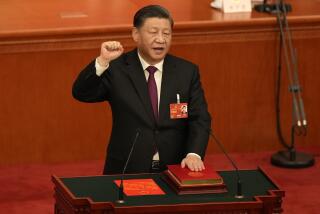Liberal Named to Lead China Party Congress
- Share via
BEIJING — Hu Qili, one of the most liberal reformers among China’s top leaders, was named Saturday to serve as the chief administrative officer for a landmark Communist Party congress that opens today.
Hu, 58, was elected to the prestigious position of secretary general of the congress at a preparatory meeting attended by 1,927 delegates.
At the last party congress, held in 1982, this position was filled by another key reformist leader, Premier Zhao Ziyang, who now is also the acting Communist Party general secretary and is expected to be confirmed in that post.
Hu’s selection was one of several indications Saturday that plans are moving forward smoothly for the congress to be a celebration of paramount leader Deng Xiaoping’s policies of openness and market-oriented reforms.
‘Open China Further’
“The central agenda item of the 13th Party Congress will be to further accelerate our reform and to open up China further,” Zhu Muzhi, spokesman for the congress, said at a press conference attended by most of the 400 foreign and Chinese reporters accredited to cover the eight-day conference.
Zhu said that the party’s decision to allow an unprecedented degree of coverage of the congress by foreign journalists--including 140 correspondents based in Beijing, 50 visiting from Hong Kong and Macao and about 90 visiting from 20 other countries--is itself “a reflection of this spirit.”
Foreign correspondents will be allowed into the Great Hall of the People today to cover the opening activities of the congress, which will also be televised live in China. The closing ceremony on Nov. 1 will also be open to the press, Zhu said.
Earlier this year, China’s reformers were placed on the defensive by a conservative ideological campaign against “bourgeois liberalization,” a code word for capitalist ideas and Western concepts of democracy.
Intellectual Shake-Up
The campaign began with the January ouster of former party General Secretary Hu Yaobang, a reformist who was criticized in a backlash against pro-democracy student demonstrations that broke out last winter. Some leading intellectuals were expelled from the party, and for several months China’s media were full of harsh rhetoric reminiscent of the late Chairman Mao Tse-tung’s 1966-1976 Cultural Revolution.
But the campaign was largely over by this summer, as reformers headed by Zhao resumed the offensive against orthodox Marxist leaders who would prefer to slow down the pace of reform. On Saturday, Zhu declared the campaign so successful that the party congress will be able to largely ignore the subject.
“This question will be touched upon during the current party congress, but this will not be one of the major questions to be discussed . . . because this question was already basically solved,” Zhu said.
Tibet Downplayed
Zhu also dismissed recent anti-Chinese demonstrations and rioting in Tibet--which some analysts believed might be used by hard-liners to try to discredit reformers at the congress--as irrelevant to the deliberations.
“The riots have already calmed down,” Zhu said. “I don’t think it is necessary to discuss this question at the party congress. I don’t think there will be any delegate who will raise this question for discussion.”
Zhu reaffirmed that the congress will push forward new policies of political reform aimed at reducing the role of the party in the economy.
“For the purpose of accelerating and deepening our reforms, in addition to the continuation of our economic structural reform, it is also necessary for us to carry out at the same time the political structural reform,” Zhu said. “Otherwise, if the political structural reform was not conducted, the economic structural reform cannot be continued.”
More to Read
Sign up for Essential California
The most important California stories and recommendations in your inbox every morning.
You may occasionally receive promotional content from the Los Angeles Times.










